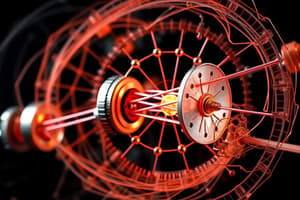Podcast
Questions and Answers
What is the unit of volume in the International System of Units (SI)?
What is the unit of volume in the International System of Units (SI)?
- Cubic Centimeter
- Millimeter
- Liter
- Cubic Meter (correct)
Which of the following is a derived unit for volume?
Which of the following is a derived unit for volume?
- Second
- Ampere
- Cubic Meter (correct)
- Kilogram
In physics, which mathematical concept is primarily used to calculate the volume of irregular shapes?
In physics, which mathematical concept is primarily used to calculate the volume of irregular shapes?
- Algebra
- Differential Equations
- Trigonometry
- Calculus (correct)
What is the volume of a cube with a side length of 2 meters?
What is the volume of a cube with a side length of 2 meters?
When identifying a physics problem involving volume, which step comes after recognizing relevant principles?
When identifying a physics problem involving volume, which step comes after recognizing relevant principles?
Which branch of physics primarily focuses on the motion of macroscopic objects?
Which branch of physics primarily focuses on the motion of macroscopic objects?
Which principle explains how certain quantities remain constant throughout a process without external forces?
Which principle explains how certain quantities remain constant throughout a process without external forces?
What concept encompasses the propagation of disturbances through space, including sound and light?
What concept encompasses the propagation of disturbances through space, including sound and light?
Which type of energy is the capacity to do work associated with an object's position?
Which type of energy is the capacity to do work associated with an object's position?
Which fundamental concept describes the rate of change of displacement of an object?
Which fundamental concept describes the rate of change of displacement of an object?
In the study of thermodynamics, which concept is directly related to the measure of disorder in a system?
In the study of thermodynamics, which concept is directly related to the measure of disorder in a system?
Which branch of physics specifically deals with the interactions between electric and magnetic fields?
Which branch of physics specifically deals with the interactions between electric and magnetic fields?
What is the term for the difficulty experienced in stopping a moving object, often associated with its mass and velocity?
What is the term for the difficulty experienced in stopping a moving object, often associated with its mass and velocity?
Flashcards
Physics
Physics
The study of matter, its motion, and behavior through space and time, including related concepts like energy and force
Classical Mechanics
Classical Mechanics
Study of motion of macroscopic objects, using Newton's laws
Thermodynamics
Thermodynamics
The study of heat, temperature, energy, and work, including laws like entropy
Electromagnetism
Electromagnetism
Signup and view all the flashcards
Motion
Motion
Signup and view all the flashcards
Forces
Forces
Signup and view all the flashcards
Energy
Energy
Signup and view all the flashcards
Quantum Mechanics
Quantum Mechanics
Signup and view all the flashcards
SI Units
SI Units
Signup and view all the flashcards
Base Units
Base Units
Signup and view all the flashcards
Derived Units
Derived Units
Signup and view all the flashcards
Physics Problem Solving
Physics Problem Solving
Signup and view all the flashcards
Problem Solving Steps
Problem Solving Steps
Signup and view all the flashcards
Study Notes
Introduction to Physics
- Physics is the natural science that studies matter, its motion and behavior through space and time, and related concepts such as energy and force.
- It's one of the fundamental scientific disciplines.
- It seeks to understand how the universe works.
- Physics encompasses a wide range of phenomena, from the smallest subatomic particles to the largest structures in the cosmos.
Branches of Physics
- Classical Mechanics: Focuses on the motion of macroscopic objects. Includes Newton's laws, rotational motion, and other related concepts.
- Thermodynamics: Deals with heat and temperature and their relation to energy and work. Covers concepts like entropy and the laws of thermodynamics.
- Electromagnetism: Explores the interactions between electric and magnetic fields and forces. Includes concepts of electric and magnetic fields, induction, and electromagnetic waves.
- Optics: Studies the behavior of light, including reflection, refraction, diffraction, and interference.
- Acoustics: Analyzes the properties of sound, including its production, transmission, and reception.
- Modern Physics: Treats phenomena at the atomic and subatomic levels, and includes relativity and quantum mechanics.
- Relativity: Describes the behavior of space and time in different situations—especially at high speeds and in strong gravitational fields.
- Quantum Mechanics: Focuses on the behavior of matter and energy at the atomic and subatomic level. Includes concepts like quantization and wave-particle duality.
Fundamental Concepts
- Motion: Deals with describing the position and movement of objects over time. Includes velocity, acceleration, displacement, etc.
- Forces: Explains how forces affect the motion of objects. Includes Newton's laws of motion, gravity, friction, etc.
- Energy: The capacity to do work. Includes kinetic energy, potential energy, and different forms of energy.
- Momentum: A measure of how difficult it is to stop a moving object. Includes the principle of conservation of momentum.
- Waves: Explains the propagation of disturbances. Includes sound waves, light waves, and other wave phenomena.
- Fields: A region of space with a physical quantity (like force, electric field) associated with each point.
- Principles of Conservation: Certain quantities, such as energy, momentum, and charge, remain constant throughout a process, provided no external forces are involved.
Measurement and Units
- Physics relies on precise measurements and standard units for consistency and reproducibility.
- The International System of Units (SI) is commonly used.
- Base units include: meter (length), kilogram (mass), second (time), ampere (electric current), kelvin (temperature), mole (amount of substance), candela (luminous intensity).
- Derived units are combinations of base units.
Mathematical Tools
- Understanding and applying mathematical principles like algebra, calculus, differential equations, and trigonometry is crucial for solving physics problems.
- Mathematical expressions are used to quantify physical laws and models.
Problem Solving
- Physics relies on solving problems involving a variety of approaches.
- These include:
- Identifying the problem and understanding it completely.
- Recognizing relevant principles.
- Developing a plan to solve.
- Executing the plan by formulating equations.
- Evaluating the result and considering potential errors.
- Physics problems typically involve applying mathematical principles to physical scenarios.
Studying That Suits You
Use AI to generate personalized quizzes and flashcards to suit your learning preferences.




